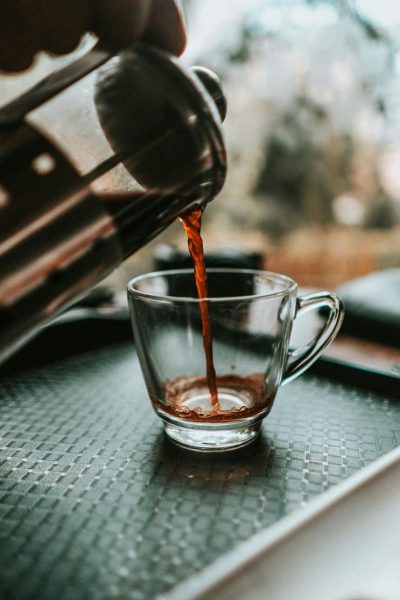
French press coffee brewing relies on full immersion extraction, where coarsely ground coffee beans steep in hot water for several minutes before being separated by a metal mesh filter. This brewing method produces a rich, full-bodied cup that retains the coffee’s natural oils and sediment, creating a distinctly different flavor profile compared to paper-filtered methods. The key to exceptional French press coffee lies in achieving the correct grind size, which directly impacts extraction time, flavor balance, and overall coffee quality.
Why Grind Size Makes or Breaks Your French Press Coffee
The relationship between grind size and extraction rate determines whether your French press coffee tastes balanced, over-extracted, or under-extracted. Coarse grounds allow water to flow freely around each particle, preventing over-extraction during the extended steeping time. Fine grounds, conversely, create excessive surface area contact with water, leading to bitter, harsh flavors and clogged filters that make plunging difficult.
The Science Behind Particle Size and Extraction
Coffee extraction occurs when water dissolves soluble compounds from ground beans. Larger particles extract more slowly, while smaller particles extract rapidly. French press brewing requires a 4-minute steeping time, making coarse grounds essential for balanced extraction. Proper grind size also prevents excessive sediment from passing through the mesh filter, keeping your cup clean while maintaining the method’s characteristic body.
Achieving the Perfect French Press Grind Size
The ideal French press grind resembles coarse sea salt or breadcrumbs, with particles measuring approximately 1000-1200 microns. This consistency allows optimal water penetration while preventing over-extraction. Your grounds should feel gritty between your fingers, with individual particles clearly visible and distinct from one another.
Visual and Tactile Grind Assessment
Professional baristas assess grind quality through both visual inspection and tactile testing. Properly ground French press coffee displays uniform particle size with minimal fine dust. When rubbed between fingers, the grounds should feel rough and granular, never powdery or flour-like. Consistent particle size ensures even extraction across all coffee grounds during brewing.
Best Coffee Grinders for French Press Brewing
Burr grinders produce superior results compared to blade grinders for French press preparation. Conical and flat burr grinders crush beans between two rotating surfaces, creating uniform particle sizes essential for consistent extraction. Blade grinders chop beans unevenly, producing a mixture of fine dust and large chunks that leads to uneven extraction.
Manual vs Electric Burr Grinders
Manual burr grinders offer excellent control and produce minimal heat during grinding, preserving coffee’s volatile aromatics. Electric burr grinders provide convenience and speed, particularly beneficial when grinding large quantities. Both options deliver superior results to blade grinders, with the choice depending on personal preferences regarding effort, speed, and budget considerations.
Step-by-Step French Press Grinding Process
Grinding Preparation:
- Measure 30 grams of whole beans for every 500ml of water (1:16.7 ratio)
- Check grinder cleanliness and ensure burr alignment
- Set grinder to coarse setting (typically marked for French press)
- Have your French press and timer ready for immediate brewing
Grinding Execution:
- Pour measured beans into grinder hopper
- Grind beans using steady, consistent motion (manual) or short bursts (electric)
- Check grind consistency and adjust if necessary
- Transfer grounds immediately to French press to preserve freshness
This systematic approach ensures consistent results and prevents grounds from losing aromatics through prolonged air exposure.
Common French Press Grinding Mistakes to Avoid
Many home brewers unknowingly sabotage their French press coffee through grinding errors that can easily be avoided:
- Grinding too fine – Creates over-extraction, bitterness, and makes plunging extremely difficult
- Inconsistent particle sizes – Leads to uneven extraction where fine particles over-extract while large chunks under-extract
- Pre-grinding beans – Grinding too far in advance allows aromatics to escape, reducing flavor complexity
- Using blade grinders – Produces uneven, inconsistent grounds that compromise extraction quality
Timing and Storage Considerations
Coffee begins losing flavor compounds within minutes of grinding. Grind beans immediately before brewing for optimal taste. Pre-ground coffee stored for days or weeks produces flat, stale-tasting results. Temperature also matters – excessive heat during grinding damages delicate flavor compounds, particularly problematic with high-speed blade grinders.
Optimizing Your Brew After Proper Grinding
Once you’ve achieved the perfect grind, water temperature becomes crucial. Heat water to 195-205°F (90-96°C), just off boiling point. Pour water over grounds using a circular motion, ensuring complete saturation. Allow coffee to steep for exactly 4 minutes before pressing the plunger down slowly and steadily.
Extraction Variables Beyond Grinding
Water quality significantly impacts final flavor. Use filtered water with balanced mineral content for optimal extraction. Brewing time affects strength and flavor balance – shorter steeps produce lighter coffee, while longer steeps increase intensity. Maintain consistent ratios between coffee and water for repeatable results.
Perfect French Press Starts with Perfect Grinding
Mastering French press grinding requires attention to particle size, grind consistency, and timing. The coarse grind size allows proper extraction during the 4-minute steeping process while preventing over-extraction and filter clogging. Quality burr grinders produce superior results compared to blade alternatives, ensuring uniform particle distribution essential for balanced flavor extraction.
For coffee enthusiasts seeking exceptional French press experiences, starting with premium green coffee beans makes a remarkable difference. Intercontinental Coffee Trading supplies roasteries worldwide with carefully sourced green beans from renowned growing regions.
Contact Intercontinental Coffee Trading today to discover how our premium green coffee beans can improve your roasting operations and deliver exceptional coffee experiences to your customers.
Remember that great coffee begins with quality beans, proper grinding, and consistent brewing techniques. Master these fundamentals, and your French press coffee will consistently deliver rich, satisfying results that showcase the unique characteristics of your chosen coffee origins.
